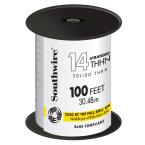I recently went to a big box store and asked for help to extend power to my front yard. I installed a total of three outdoor rated electrical outlets with the cover plate that covers the entire area. I used gray PVC 1/2" pipe and bought three individual spools of 14g wire in black, white and green. The rep handed me these items after I told him what I was doing. After getting home I cut the wires and installed and glued the PVC pipe with the wires in position (I left about 6" of wire I folded back into the electrical box in order to install the electrical outlets the next day. That's when I realized after using my stripping wire tool that the guy at the store sold me stranded wire instead of solid wire. I got rather upset at this thinking it was not the best option for outdoor underground wiring for outdoor electrical boxes. I called the company of the wire product and left a message to get some input from them and they haven't returned my call. But what gives me the impression that this is really bad is that upon closer inspection of the label in cellophane wrap the wire label says "machine wire."
Was this a bad idea? I basically installed these outlets to power outdoor water features that will run fourteen to sixteen hours a day. And then some LED holiday lights for Christmas. I'm reading that stranded wires can oxidize faster due to more strand surface and since this is outdoors that makes me concerned. Although I do live in the dry desert with almost no rain and very low humidity.
Should I redo my work and buy solid copper wire? I feel like a dummy that I didn't pay closer attention to what I was literally handed to buy. But I did tell the rep what I was trying to achieve.
Input, please?

